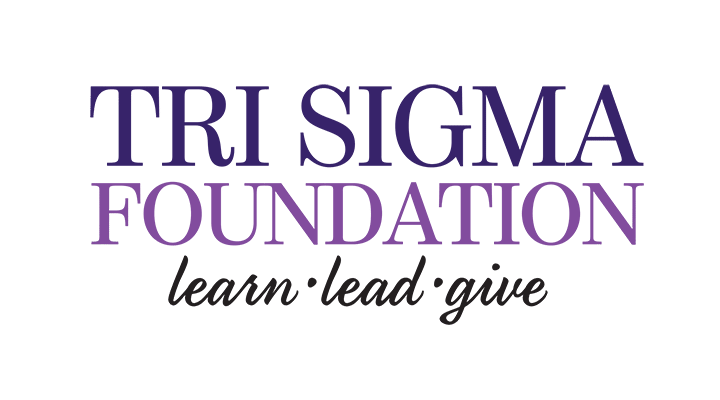Announcing the Inclusive Excellence Committee
This month, six alumnae and four collegians were selected to serve on the Inclusive Excellence standing committee. This committee will review the sorority’s current climate, policies, and practices related to diversity, equity, and inclusion, engage with and gather input from members of the sorority’s constituency groups, research best practices, assist with identifying tools and developing educational materials for increased dialogue and civil discourse, and monitor progress towards implementation of diversity, equity, and inclusion initiatives.
Meet each member below and read an excerpt from their response to the question, “why are diversity, equity, and inclusion imperative for the future of fraternal organizations such as Tri Sigma?”

Leslie Deeb, Committee Coordinator, Beta Epsilon, Western Illinois University
Leslie Deeb, Committee Coordinator, Beta Epsilon, Western Illinois University
I believe fraternal organizations, such as Tri Sigma, are well past their due date to set diversity, equity, and inclusion practices into motion. The only way fraternal organizations can begin to re-imagine their representation in this world, and their purpose is by having authentic, raw conversations. These conversations must happen regularly from member to member in individual chapters all the way to the leadership entities in national headquarters. Fraternal organizations must begin to acknowledge, welcome, and celebrate the unique, lived experiences of our individual members who have minoritized, marginalized intersectional identities. It is critical that fraternal organizations create, promote, and foster an environment that is inclusive and equitable so that diverse identities can thrive in our spaces.

Pritali Amrutkar, Epsilon Theta, Oglethorpe University, and Atlanta Alumnae Chapter
Pritali Amrutkar, Epsilon Theta, Oglethorpe University, and Atlanta Alumnae Chapter
Black sisters, Indigenous sisters, other sisters of color, LGBTQIA+ sisters, lower income sisters, disabled sisters, and others who face discrimination in their day to day life deserve to have a place they can call home. In the end, that’s what Tri Sigma is about – having a place you can call home. Many disenfranchised women struggle with this as it is because society at large has deemed that irrefutable qualities of themselves – the color of their skin, their sexual orientation, the socioeconomic class in which they grew up – make them lesser, Tri Sigma can be a place they can turn to for comfort and security.

Giselle Chun, Epsilon Nu, University of North Carolina at Greensboro
Giselle Chun, Epsilon Nu, University of North Carolina at Greensboro
The standards that are taught and upheld should include an understanding and acceptance of diversity among members based on race, identified gender, ethnicity, culture, LGBTQIA+ identity, etc. as the experiences one has in college and in organizations, whether fraternal or otherwise, can strongly influence the impact the individual makes in the world. By including these important features in fraternal life, we set a positive standard for change and can positively influence other organizations and groups to follow in our footsteps.

Charlotte Coberley, Omicron, Eastern Michigan University
Charlotte Coberley, Omicron, Eastern Michigan University
As microcosms of society, historically white fraternal organizations (HWFOs) mirror the systemic oppression that is rooted deep within the fabric of our nation. It is imperative that Tri Sigma (and other HWFOs) engage in unlearning and redefining its generationally inherited oppressive practices before it can begin to champion ones that center diversity, equity, and inclusion.

Miranda Himel, Alpha Mu, University of Louisiana at Lafayette, and Lafayette Alumnae Chapter
Miranda Himel, Alpha Mu, University of Louisiana at Lafayette, and Lafayette Alumnae Chapter
It is not enough to simply keep up with social norms, we must continue to fulfill our legacy of activism and lead the way. Without our societal mission, I believe we will fail to recruit future generations of young, powerful global citizens, eventually leading to the eradication of fraternal organizations altogether.

Crystal Jones, Zeta Pi, Virginia Wesleyan University
Crystal Jones, Zeta Pi, Virginia Wesleyan University
It is important to me to know that my sisters nationwide are with me in the belief that every single woman-identifying member of this organization and human being in this country deserves respect, equality, and belonging in all aspects of life. If we want to be known as women of character, we must lead the charge and hold ourselves, AND others accountable in this fight.

Logan Levine, Alpha, Longwood University
Logan Levine, Alpha, Longwood University
We want fraternal life to be a place where individuals of all races, genders and gender identities, orientations, and beliefs to feel loved and supported and are given chances to grow and help others in ways not previously available to them.

Maria Price, Alpha Beta, Kent State University
Maria Price, Alpha Beta, Kent State University
By making Tri Sigma and other organizations inclusive and welcoming, we open the door to vibrant members that keep us growing as chapters. We are able to challenge ideas and the ways “it’s always been done.” We are able to build support systems for these many communities in spaces they have been told for years they were not welcome.

Berylann Rivera, Eta Nu, Ramapo College of New Jersey
Berylann Rivera, Eta Nu, Ramapo College of New Jersey
DEI exists to say that we are not content with just having visible representation but want to ensure that all members, particularly those holding identities that are often minoritized by society, find a home in an organization that is truly accepting, aware, and prepared to make the changes necessary to ensure that everyone has a great experience.

Lily Rupert, Epsilon Chi, Northeastern University
Lily Rupert, Epsilon Chi, Northeastern University
To continue to exist we must evolve from our history and seek to move with the tides of progress. Tri Sigma has the capacity to be better, and in knowing that, it’s our job as members to push our organization to do better.

